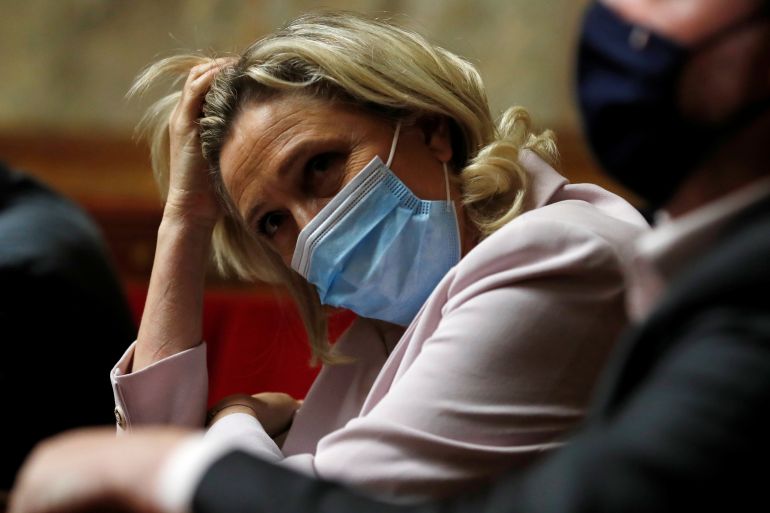After regional polls, is Le Pen further away from the presidency?
The French far right, like Macron’s centrists, performed poorly in recent regional polls, while conservatives gained.

Paris, France – France’s far-right National Rally party did not receive the victories many pundits and opinion polls had predicted in the first round of Sunday’s regional elections, a sharp setback for Marine Le Pen as she looks to cement her party’s legitimacy before next year’s presidential race.
While regional elections do not typically carry significant weight in France, analysts kept a close eye on this year’s race seeking clues into next year’s critical vote.
Keep reading
list of 4 itemsHow the far right got a stranglehold on the West
Macron, Le Pen fail to gain traction in French regional elections
Macron slapped in face during walkabout in southern France
Pre-election polls projected the National Rally could take half of the country’s 12 mainland regions.
But the far-right party ended up only narrowly taking the lead in one race – the southern Provence-Alpes-Côte d’Azur region.
Overall, the Nationally Rally carried only 19 percent of the vote nationwide – worse than its performance in 2015’s regional elections.
“Our voters did not come out,” Le Pen said on Sunday, urging supporters to “mobilise their efforts” for next weekend’s runoff.
Jean-Yves Camus, a political scientist specialising in the far right, told Al Jazeera: “Those who intended to vote for the National Rally largely stayed at home.”
Voter turnout reached historic lows on Sunday, with only a third of the electorate participating.
Camus warned that it would be misleading to compare regional elections with a presidential race, where turnout is much higher.
Nearly 78 percent of the electorate participated in the 2017 presidential elections, when Le Pen made it to the final round, ultimately losing against Emmanuel Macron.
Since then, the 52-year-old has worked tirelessly to “de-demonise” the far-right party’s image to appeal to more mainstream voters.
Founded by her father Jean-Marie Le Pen in 1972, the party has long been accused of anti-Semitism, racism and xenophobia.
Le Pen has publicly distanced herself and the party from her father, who has been fined multiple times for Holocaust denialism.
In 2018, she changed its name from the National Front to the National Rally, stating the old label was a “psychological barrier” to voters.
Since then, the image of the party in the eyes of some has shifted.
A study published in April by the left-leaning think tank Jean-Jaures found that 35 percent had an unfavourable view of the party in April 2021 compared with 50 percent in 2019.
“It’s a radical evolution,” Max-Valentin Robert, one of the co-authors of the study, told Al Jazeera.
The report also predicted that for the first time, Le Pen stood a chance to defeat Macron in 2022.
To do so, however, it argued she would have to win over a significant share of mainstream conservative voters.
If Sunday’s regional elections offered any clues, it is that Le Pen has not roped in those voters just yet.
Macron ‘has no party’
The mainstream conservative party, Les Republicains, fared better than expected, taking in 29 percent of the nationwide vote.
Xavier Bertrand, an incumbent who secured a surprise healthy lead in the Hauts-de-France region, told supporters: “We have released this region from the jaws of the National Front.”
Originally forecast as a close race, Bertrand, who is also running for president next year, took in more than 41 percent of the vote while the far-right candidate, Sebastién Chenu, captured only 24 percent.
Macron’s centrist party, La République en Marche, walked away from Sunday’s first round with particularly disastrous results, taking in only 10 percent of the nationwide vote and leading in none of the 12 mainland regions.
“Macron’s issue is that he has a good chance of being re-elected next year, but his issue is that he has no party,” Camus said.
Macron and Le Pen are preparing for a rerun of the 2017 vote, with both standing a chance at reaching the second round again.
In recent months, both have been attempting to appeal to the same conservative electorate.
By leaping right, Macron’s party has been accused of helping de-stigmatise the far right and its hardline stances on immigration, Islam, secularism and crime.
Meanwhile, in recent months, questions of identities have played an increasing role on the French political stage from debates about the influence of so-called “Islamo-leftism” – a conspiracy theory that links Muslim activists and the left wing in furthering a certain agenda – to efforts banning gender-inclusive language in French classrooms.
Looking ahead, after their recent flops, Le Pen and Macron are urging voters to head to the polls for next weekend’s runoff, warning about the dangers of abstention.
“To let abstention win is to make democracy lose,” Prime Minister Jean Castex tweeted on Monday morning, adding that voting was every citizen’s “responsibility”.